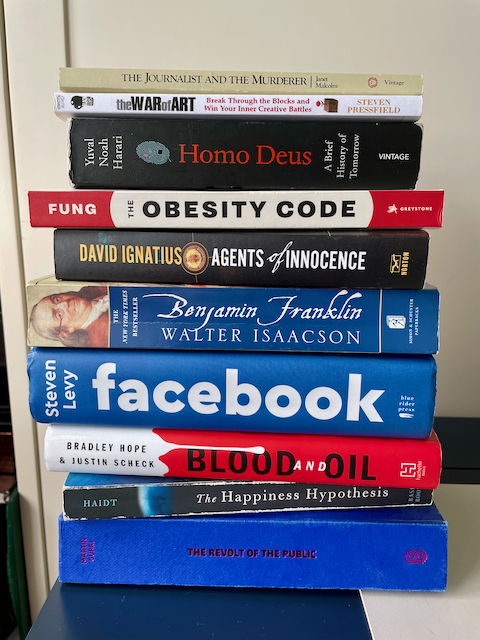Here are the most intriguing books I read in 2021.
As ever, this list isn’t confined to titles published during the year. And as in previous years, I continue to prefer print books over e-books.
They are better for making notes in the margins, being able to flip through them aids in the learning process, and I appreciate the ability to pick them up off the book shelf to consult later, after I’ve read them. And I just love the tactile sensations of holding them in my hands.
My nonfiction picks spanned tech, history, current affairs, philosophy and art. For fiction, I found pandemic-era solace in revisiting a genre I have always loved: spy thrillers.
Nonfiction
- Martin Gurri, The Revolt of The Public and the Crisis of Authority in the New Millennium This book by Gurri, first released in 2014 and since updated, has been hailed presaging the election of Donald Trump and the success of Brexit. Gurri’s thesis: Technological forces like the internet and social media, which have resulted in an exponential explosion of information, by nature undermine civil institutions and traditional figures of authorities. This democratization of information has exposed elites’ flaws, Gurri writes, sapping their ability to control once unquestioned narratives. Distrust now abounds.
-
Steven Levy, Facebook: The Inside Story. I enjoy books that tell the stories of singular tech companies, such as Brad Stone’s comprehensive looks at Amazon (“The Everything Store”) and Airbnb and Uber (“The Upstarts”), Duncan Clark’s book about Alibaba, and Ken Auletta’s look at Google. This 2020 work provides a comprehensive history of how Mark Zuckerberg started Facebook, how it expanded quickly in the U.S. and then abroad, and how its emphasis on growth has created massive successes – and more recently, challenges – along the way. Useful as a backgrounder in understanding a company I did a lot of reporting on during the year.
-
Bradley Hope and Justin Scheck, Blood and Oil: Mohammed bin Salman’s Ruthless Quest for Global Power. A painstakingly researched, deftly told, utterly fascinating look at the Saudi crown prince, and what his rise means for his nation and the world. A rarity in nonfiction: a page turner that informs. By Hope, formerly of the The WSJ, and my current, supremely talented WSJ colleague Scheck.
-
Jonathan Haidt, The Happiness Hypothesis: Finding Modern Truth in Ancient Wisdom. A wonderful book centered on ten timeless ideas from various cultures about human flourishing and what makes for a good life: why love and work are important, the benefits of adversity and reciprocity, why we’re all hypocrites on some level, and why happiness comes not just from within, but from without.
-
Janet Malcolm, The Journalist and the Murderer. How and why journalism can be a messy business. Controversial. Extremely meta. I’m not sure I agree with its central claim that journalism is inherently psychopathic, but it is a quick and thought provoking read.
-
Steven Pressfield, The War of Art: Break Through the Blocks and Win Your Inner Creative Battles. Worthy of its cult classic status. Meditations on why making art is hard, and why you just have to battle through what Pressfield calls “resistance”: fear, anxiety, laziness, whatever keeps you from articulating your creative vision. You just gotta sit down and do the work.
-
Yuval Noah Harari, Homo Deus: A Brief History of Tomorrow. After largely conquering disease, war and famine, humans are becoming increasingly individualistic, powerful, humanistic, liberal. Next up: seeking immortality as we make gains in artificial intelligence and biotechnology. (See also: Harari’s earlier book, Sapiens: A Brief History of Humankind.)
-
Jason Fung, MD, The Obesity Code – Unlocking the Secrets of Weight Loss. I’ve long been interested in nutrition and find the research showing the benefits of low-carbohydrate, high fat diets to be compelling. In this straightforward book, Fung, a nephrologist who has had significant success treating diabetics with fasting and carb restriction, shows that weight gain is driven by high-carb, sugary foods that cause spikes in insulin. In short: sugars and starches are the problem, not fats or even calories. (See also: Nina Teicholz’s suberb The Big Fat Surprise: Why Butter, Meat and Cheese Belong in a Healthy Diet.)
-
Walter Isaacson, Benjamin Franklin: An American Life I’d never read anything extensive about the brilliant, complex, dedicated, whimsical Franklin – the “founding father who winks at us,” Isaacson writes. Franklin had so much to do with with the U.S. became.
Fiction
-
David Ignatius, Agents of Innocence: A Novel. I love spy thrillers but had never read this excellent novel from the Washington Post columnist. Set in Beirut in the 1970s, the protagonist is a CIA officer working to gather intelligence on the PLO. This book, Ignatius’s first, led me to some of his others…
-
David Ignatius, The Quantum Spy: A Thriller. The U.S., China, and quantum computing. Lots of fun.
-
David Ignatius, The Paladin: A Spy Novel. Cyber-security, media manipulation, deep fakes, financial fraud. Another page-turner.
-
Ken Follett, Eye of the Needle. Speaking of spy thrillers, I decided to re-read this classic, set during World War II, which I first encountered more than 20 years ago. What a read: wonderfully paced, strong characters, high stakes.
